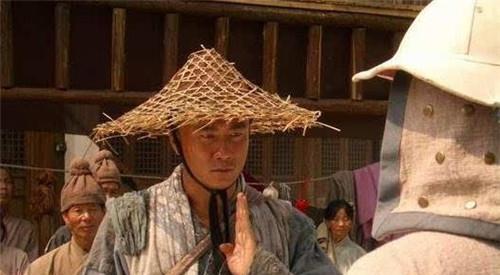Friends who have watched "Huan Zhu GeGe" know that the Qianlong Emperor especially likes micro-service private visits, and the Qianlong Emperor and Xiao Yanzi and the Five Brothers and their party dress up as ordinary people, come to the people to watch the lives of the people at close range, and discover the hidden dangers as soon as possible. Qianlong was not the first person to pay a private visit, and an emperor before him did the same, and he also disguised himself as a poor beggar to ask for food, which was terrible, and 5 high-ranking officials were killed.

He is the Ming Taizu Zhu Yuanzhang, Zhu Yuanzhang is a famous grassroots emperor in our country, the family is very poor, has not read any books, grew up as a cow herder, his father, mother and eldest brother died one by one because of drought and famine, Zhu Yuanzhang can not even afford to buy a coffin, can only wrap the body of his relatives with his second brother in torn clothes, in exile he was oppressed by corrupt officials, planting the seeds in his heart to change all this.
At the age of 25, Zhu Yuanzhang defected to Guo Zixing, and with his wit and bravery, he quickly gained Guo Zixing's appreciation and became the commander of the Ninth Husband, and Guo Zixing's beloved adopted daughters were all married to Zhu Yuanzhang.
Through the ups and downs, he has embarked on the peak of his life. In the first year of Hongwu (1368), Zhu Yuanzhang was proclaimed emperor in Nanjing, with the name Of Daming and the era name of Hongwu. Zhu Yuanzhang knew more about the sufferings of the people than the princes who ate and ate well, so after he took the throne, he ordered the peasants to return to farming and rewarded the reclamation of the land; organized peasants everywhere to build water conservancy projects; he especially hated corrupt officials and corrupt officials, promulgated a series of laws and tortures to punish them, and finally, the social productive forces developed.
The nineteenth year of Hongwu was an extraordinary year, and Zhu Yuanzhang pulled out many corrupt officials and corrupt officials. This year, huainan was in a drought, and the people did not have a good life, zhu Yuanzhang immediately informed the officials to open a warehouse and release grain, he did not want the people of Huainan to experience what his family had suffered.
At the same time, Zhu Yuanzhang also decided to go to Huainan to have a look in person. He put on the old clothes he had worn before, and when he rushed to Huainan, he was a dusty servant, no different from the local hungry people, and he simply became a beggar. When he came to Huainan, what Zhu Yuanzhang saw in front of his eyes was far more serious than what he saw on the fold: there were hungry people everywhere, people had sunken cheeks because of long-term hunger, and real beggars were lying on the ground, and they did not receive any grain from distribution.
Zhu Yuanzhang understood that the money and grain that the state had brought for disaster relief had already gone into the pockets of corrupt officials and corrupt officials. He quietly returned to the palace, wrote down the names of the persons in charge, and on the 2nd day, all 5 high-ranking officials involved in the case were beheaded and displayed in public.
This was not over, Ming Taizu, who had always hated corrupt officials, continued to check Huainan's files and found that Liu Zhiren, the imperial historian of the Metropolitan Inspection Yuan, had been ordered to go to Huai'an to deal with a case, but he had not finished the case for a long time, and it turned out that Liu Zhiren was "eating" the plaintiff and the defendant and extorting money from the two families. Further investigations were carried out, and 61 officials of the six sections were found to have committed acts of corruption and bribery to varying degrees, and they were dealt with one by one.
Zhu Yuanzhang was very angry, and he, who had always been an "anti-corruption official," issued an edict: "For the sake of the people's lives, those who commit crimes against officials who have embezzled more than sixty taels will be executed and will never forgive loans." This means that as long as more than 60 taels of silver are embezzled, regardless of status, they will be killed.
Later, he formulated a program for rectifying corruption--the "Great Commandment" and the "Brief Record of Awakening Corruption," which recorded in detail his attitude toward corrupt officials, methods of handling cases, and means of dealing with them, and demanded that the whole country publicize the book, let the people learn to deal with corrupt officials after studying it, and let officials self-discipline and self-examination after reading it, with remarkable results.
Zhu Yuanzhang was in power for 31 years, and successively launched 6 large-scale crackdowns on corruption, killing 150,000 corrupt officials and corrupt officials.
Reference: Twenty-Two Historical Notes